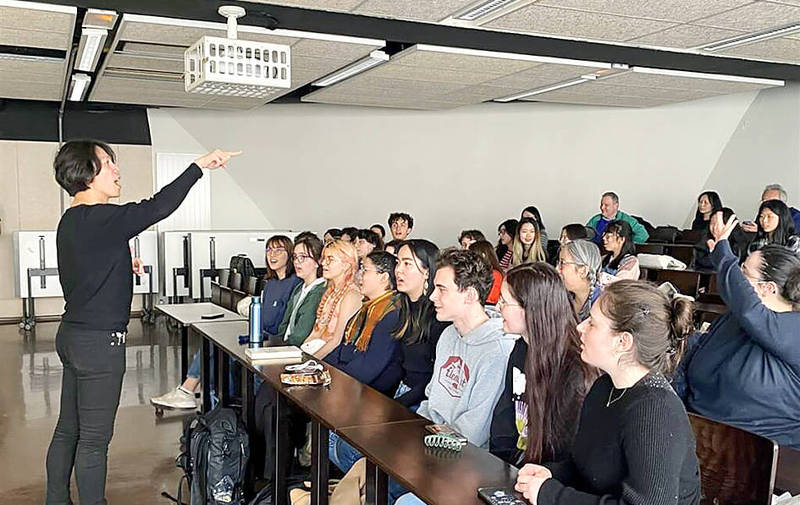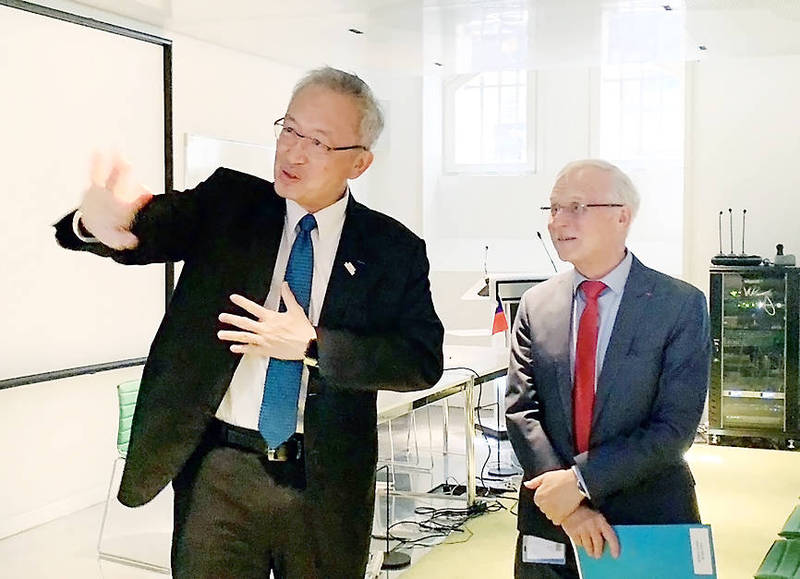《TAIPEI TIMES》Class in Paris filled with sounds of Hoklo

Taiwanese teacher Liu Chan-yueh , left, teaches French students to sing Hoklo songs at the University of Languages and Civilizations (INALCO) in Paris on June 14. Photo: CNA
TEA AND POETRY: The teacher said the most profound exercise he leads is to recite ancient Chinese poetry in Taiwanese at tea houses, capitalizing on its phonetics
Staff writer, with CNA
In a classroom in Paris, Representative to France Francois Wu (吳志中) was serenaded with ballads from his homeland, sung not in French or Mandarin, but in Hoklo (commonly known as Taiwanese).
For about two hours, the University of Languages and Civilizations (INALCO) classroom was filled with the sounds of French students singing in the language.
Some INALCO students sang without even glancing at the lyrics, weeks of effort to memorize and pronounce the words properly coming to fruition.
The joy in the classroom was palpable, prompting Wu to join in singing some of the songs himself.
“Of course, we encourage the promotion of Taiwanese here [in France], because we want more and more people to understand the language,” Wu said, adding: “Lots of the students decide to come and visit Taiwan after they’ve become proficient.”
Student Marie Izdag, who has visited Taiwan many times, said she thinks promoting Taiwanese language and culture is crucial to expand international recognition of Taiwan and would help people across the world learn more about the nation’s history.
Izdag was one of many INALCO students who has studied Taiwanese at the university and was tutored by Liu Chan-yueh (劉展岳), who has taught Mandarin and Taiwanese at INALCO since 2019.
During Liu’s first year in the job, the teacher in charge of Cantonese quit suddenly, leaving a course vacancy at the institution.
Liu submitted an application to have Taiwanese replace it and the request to upgrade “Southern Min” from a casual class taught sporadically to an official elective called “Taiwanese” was officially approved in 2020.
“Many people say Taiwanese is Southern Min, but the Taiwanese language actually comes with a lot of historical background that does not exist in Southern Min, incorporating [influences from] Dutch, Spanish and the indigenous languages,” Liu said. “It continued to evolve after Japanese colonization, and was morphed by French and American cultures into what it has become today.”
The course, despite being launched in 2020 amid the COVID-19 pandemic, was well received, with 80 students signing up.
Regular in-person classes resumed after the pandemic subsided and students finally got the full experience of Liu’s interactive teaching style, which combines studying hard with fun.
Aside from karaoke sing-alongs, creative activities that he incorporates into his lessons include mimicking Taiwanese-language announcements at high-speed rail stations.
The most profound exercise Liu leads his students in is reciting ancient Chinese poetry in Taiwanese at Taiwanese tea houses.
Liu said that Taiwanese is actually phonetically closer to the Chinese spoken in ancient China, and pairing classical poetry recital with Taiwanese tea creates an immersive experience that could be palpably embraced by his students and audiences.
“It’s rare to have someone with such in-depth knowledge of the Taiwanese language teaching here,” INALCO director of continuing education Catherine Legeay-Guillon said. “That is why students like the class so much, especially listening to Taiwanese songs and watching Taiwanese films.”
It was Taiwan’s multiethnic and multilingual background that made him want to showcase his beloved country to the world, Liu said.
“Learning Taiwanese can provide you with the opportunity to see a different side of Taiwan,” he told the students, adding that although it is easy to get around Taiwan speaking only Mandarin, learning Taiwanese can help people gain deeper insights into the cultural nuances, and help them build connections and find opportunities.
“To me, teaching Taiwanese is a road home, and it is this road that has given me the opportunity to encourage those from France and other countries to go ‘take a stroll’ around Taiwan,” he said.
新聞來源:TAIPEI TIMES

Representative to France Francois Wu, left, speaks to Academie Francaise director Thomas Romer in an undated photograph. Photo courtesy of the Ministry of Foreign Affairs via CNA

















